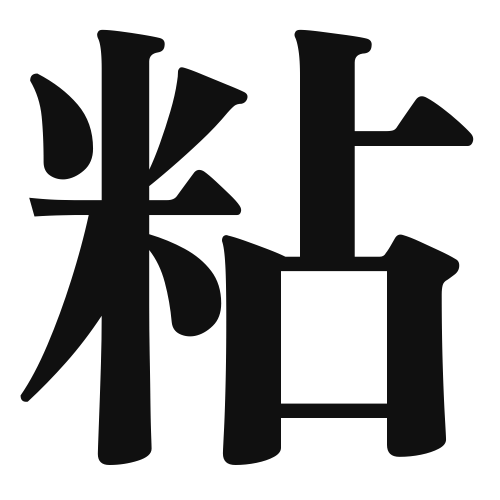1. Overview of Meaning
The kanji “粘” (nen) primarily means “sticky” or “adhesive.” It describes the quality of being viscous or having a tendency to adhere to surfaces.
2. Formation and Radical
Formation of the Kanji: The kanji “粘” is a phonetic-ideographic character (形声文字). It combines the radical for “rice” (米) with a phonetic component that suggests the sound “nen.” This reflects its association with substances that are sticky or viscous, often related to rice or similar materials.
Radical: The radical of “粘” is “米” (rice), which is commonly associated with food and agricultural products.
3. Examples of Usage
Common Words and Phrases:
- 粘土 (ねんど, nendo) – clay
- 粘着テープ (ねんちゃくてーぷ, nenchakutēpu) – adhesive tape
Example Sentences in Daily Conversation:
- この粘土はとても柔らかいです。 (Kono nendo wa totemo yawarakai desu.) – This clay is very soft.
- 粘着テープを使って、箱を閉じてください。 (Nenchaku tēpu o tsukatte, hako o toji te kudasai.) – Please use adhesive tape to close the box.
4. Synonyms and Antonyms
Similar Kanji:
- 粘り (ねばり, nebari) – perseverance or stickiness, emphasizing the quality of being sticky.
- 糊 (のり, nori) – glue, which also implies stickiness but is a specific substance.
Antonyms:
- 乾燥 (かんそう, kansō) – dryness, which is the opposite of stickiness.
5. Cultural and Historical Background
Relation to Japanese Culture: The concept of stickiness is often associated with traditional Japanese foods, such as rice and mochi, which are known for their adhesive qualities. This reflects the importance of rice in Japanese culture.
Proverbs and Idioms:
- 粘り強い (ねばりづよい, nebarizuyoi) – “persevering,” which uses the root “粘” to describe someone who is persistent and does not give up easily.
